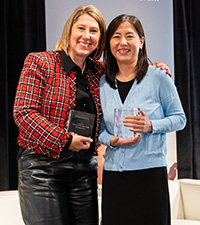
Two of the winners – Gladys Jin, Head of Centre of Excellence in Global Treasury and Financial Services at Microsoft, and Brandy Newhof, Senior Director of Treasury at Walmart – then joined Sophie and the other panellists to discuss everything from navigating different cultures to claiming credit for personal achievements.
Following on from Flora’s comments about aligning with the mission of an organisation, Brandy spoke about her current role at Walmart, and the company’s mission to save people money so they can live better, “which resonates with me and with my family.” In particular, she said she has found a passion in trade finance, explaining how the company’s supplier financing programmes had helped suppliers access working capital and liquidity during the pandemic.
“A lot of those are women-owned businesses or minority-owned businesses that often struggle to get financing and see their products on the shelves alongside the big guys,” she added. “That’s something that gives me a lot of passion and makes me get up in the morning.”
Turning points and inflection points
Gladys spoke about moving from China to the US to take on her role at Microsoft, which she described as “one of the most significant decisions I have ever made in my life.” While the decision involved carefully weighing up the impact on her family, Gladys says the move was a turning point in her career, which has empowered her with a global perspective she would never otherwise have gained.
Tiffany Eng, Corporate Treasurer at BNY, explained how her career trajectory has followed a less linear path than many. After initially starting her career in finance, she decided to “go make the world a better place” and enrolled at law school, after which she worked at the Office of the Comptroller of the Currency. “I would call that part of my career an inflection point, because this was when a slew of regulations was being written for banks,” she said.
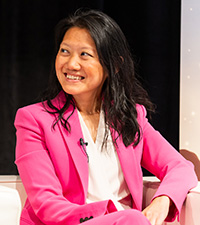
On her first day in the job, she was tasked with working on the liquidity coverage ratio, which she described as a great opportunity to develop her skillset and experience. “So, while I had not initially expected to return to finance, I found myself back at a bank, and then joined BNY a couple of years ago, where I recently took on the treasurer position.”
Maureen Elworthy, Executive Director at J.P. Morgan Payments, described her own career journey, which included working for an international supermarket company alongside her studies, and then working her way up through the organisation. “I worked full time, went to school at night, got married, had a baby, went to school again to get an MBA,” she explained. Her journey took her into treasury, after which she joined J.P. Morgan, “so it’s a little bit different moving from being the client to serving the client.”
Adapting to different cultures
Sophie asked the panellists about their experiences of adapting to different cultures. Gladys described the challenges she had faced on moving to the US, both because of the language barrier and because she wanted to spend time learning before contributing to conversations. “After a month, my manager said she wanted to hear my voice and my opinion. She said, ‘It’s OK, we know there are things you’re not 100% sure about, but that’s totally fine.’”
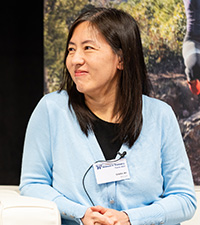
As Gladys explained, in East Asia the culture was more to do due diligence before meetings and be more certain before speaking up. “But here, the culture is more that people really want to hear your thoughts.” Understanding these different viewpoints has helped to shape Gladys’ leadership style as she manages a global team, and to ensure that everyone feels heard.
Maureen discussed her experience of moving from a corporate treasury role to work for J.P. Morgan. “For the majority of my career in the treasury function, there were so many acronyms used in the field. When I started at J.P. Morgan, there were [so many] new acronyms, so I had to ask a lot of questions. In addition, I had previously been the client, but now I was the person selling to that client, which was a new and exciting challenge.” Likewise, adapting to a more heavily regulated environment required flexibility and adaptability: “I went in thinking I knew so much about payments, but I’m still learning something new every day.”
Navigating age in the workplace
Citing the Women in Treasury Global Equity Study 2024, which is supported by Standard Chartered, Sophie noted that one thing that had come out of the research is the extent to which age can intersect with gender, compounding the difficulties women may face. “For a lot of your career you feel like you’re too young, then everyone’s worried you might have a child, then they’re worried you might be about to start the menopause,” she reflected.
Tiffany noted that factors such as age, culture and confidence can all affect how women are perceived by others. “For me, what I always anchor back to is knowing my stuff very, very well.”
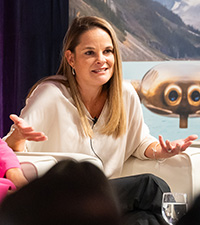
Brandy added that sometimes individuals – often young women – may be reticent when it comes to speaking up during meetings. “I see them on the outskirts, I see them not speaking up, and then after the meeting I get these amazing emails saying, ‘I think we should do this.’ And I think, ‘Where were you in the meeting?’ Sometimes as treasury leaders it’s important that we give people a voice and encourage them to step up.”
Sophie invited panellists to consider the meaning of community. As the child of a single mother, Brandy said she grew up with strong women around her – “but when I think about community, I think it’s about being part of something bigger. Maybe it’s your church, maybe it’s your class, maybe it’s your colleagues. I think it means showing up daily – we all have different gifts that we can offer.”
Tiffany spoke about her experience of a personal health issue, noting that the support she received from female colleagues “was tremendous during that time. I would say that has opened up an entirely new community – I have met so many women or friends of friends who are going through a similar experience.” Likewise, she highlighted the value of resources and networks available through the workplace in connecting people and sharing their stories.
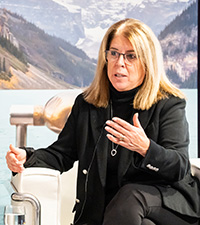
Turning to the challenge of silencing one’s inner critic and claiming credit for personal success, Maureen explained how a leader in her company had encouraged her to use the word ‘I’ rather than ‘we’ when speaking about a project she had worked on. “She said, ‘This is yours – you did it, you have to say ‘I’. And it was really hard for me to think like that. For most of my career, I’ve been in partnership with someone else.”
Brandy reflected that when recruiting for accounting and finance development leaders, the company had asked candidates about how they had contributed. “And consistently, the women that interviewed said things like ‘my team’, but they didn’t talk about what they specifically had done. That became a big point of debate when we were talking about whether or not that person was qualified.”
Finally, panellists spoke about navigating the office environment and being ‘seen’ for opportunities that might arise. Brandy shared some advice she was given by a mentor: “Don’t be the last one to arrive to a meeting – get there a couple of minutes early. And don’t be the first one out of the meeting.”
As she explained, “There’s so much that happens in those few minutes before a meeting starts, and in the minutes when you’re walking down the hall. I think as women we shy away from that, because we’re so focused on getting things done.”

